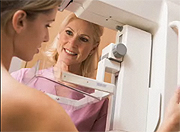- Gelatin vs. Collagen: Which is Best for Skin, Nails, and Joints?
- The Long-Term Effects of Daily Turmeric Supplements on Liver Health
- Could Your Grocery Store Meat Be Causing Recurring UTIs?
- Are You Making This Expensive Thermostat Error This Winter?
- Recognizing the Signs of Hypothyroidism
- 10 Strategies to Overcome Insomnia
- Could Artificial Sweeteners Be Aging the Brain Faster?
- Techniques for Soothing Your Nervous System
- Does the Water in Your House Smell Funny? Here’s Why
- Can a Daily Dose of Apple Cider Vinegar Actually Aid Weight Loss?
Many Americans Not Getting Routine Cancer Screenings: CDC


Many Americans aren’t getting recommended screening tests for colon, breast and cervical cancers, a new federal study shows.
Among adults in the age groups recommended for screening, about two in five were not up to date with colon cancer screening, one in four women were not up to date with breast cancer screening, and one in five women were not up to date with cervical cancer screening.
In 2013, colon cancer screening rates were unchanged from 2010, the investigators found. In addition, cervical cancer screening using the Pap test in women aged 21 to 65 was lower than in 2000, and mammography screenings for breast cancer showed little change from previous years.
One expert offered some theories on the disappointing screening rates.
“It is often difficult to get patients to comply with screening tests, especially when they are uninsured or underinsured,” said Dr. Stephanie Bernik, chief of surgical oncology at Lenox Hill Hospital in New York City. “People often put their health last, and think that as long as they feel well, they don’t need to worry.”
But doctors need to convince patients otherwise, because “screening is meant to catch diseases when they are in their infancy and more easily treated,” Bernik added.
Another expert offered a different theory on the lackluster screening rates.
“Given the press associated with the questioning of the value of breast mammography and PSA blood testing [for prostate cancer] over the past several years, many [people] are confused about the true value of cancer screening,” said Dr. Louis Potters, chief of radiation medicine at the North Shore-LIJ Cancer Institute, in New Hyde Park, N.Y.
The new study showed that only about 58 percent of adults aged 50 to 75 were screened for colon cancer, while almost 73 percent of women aged 50 to 74 had a mammogram, and nearly 81 percent of women aged 21 to 65 had a Pap test.
All those rates are below the Healthy People 2020 targets, according to the study published in the May 8 issue of the Centers for Disease Control and Prevention’s Morbidity and Mortality Weekly Report.
The lowest screening rates tended to be among adults without insurance or a usual source of health care. For example, fewer than 25 percent of those adults had had a recent colon cancer screening, compared with more than 60 percent of adults with private insurance or a usual source of health care.
“It is concerning to see a stall in colorectal cancer screening rates,” Dr. Lisa Richardson, director of the CDC’s Division of Cancer Prevention and Control, said in an agency news release.
“We must find new ways to make people and providers aware that getting tested for colorectal cancer could prevent cancer and save their lives,” she added.
In the United States, experts advise most people to begin colon cancer screening at age 50. The U.S. Preventive Services Task Force recommends three choices: an annual stool test; sigmoidoscopy every five years, along with stool testing every three years; or colonoscopy every 10 years.
The study did find that the breast cancer screening rate among women with the highest levels of income and education exceeded the Healthy People 2020 target, and that the rate of colon cancer screening among adults aged 65 to 75 was also close to the target.
“Clearly the message is getting through to some, as educated and higher socioeconomic individuals are being tested,” Potters said. “Going forward, the goal will be to educate everyone on the value of appropriate cancer screening and link that to insurance coverage and access.”
More information
The U.S. National Cancer Institute has more about cancer screening.
Source: HealthDay
Copyright © 2026 HealthDay. All rights reserved.










